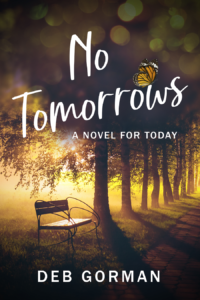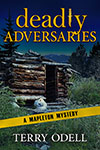I just finished a three-day inaugural city-wide event in Garland, Texas, which featured my first Tucker Snow novel, Hard Country. This great honor was calledOne Book – One Garland, and was a gathering of readers and book clubs that culminated with a meet the author night, an in-conversation interview between myself and a former student who is now the Director ofCommunications for one of Texas’ largest school districts, and my typical avant garde writing workshop.

My workshops aren’t hands-on critique, practice events, but adiscussion of writing, research, the challenges I’ve experienced and overcome, and tips to polish would-be authors’ work. It was a fluid discussion that hopefully answered most of the questions from over thirty attendees.
I surprised them at the outset. “What do you want to know or hear about?”
Those who’d been to workshops tilted their heads at me like a dog looking at a new pan. This was something new.
That opened the dance to a variety of questions about writing, and comments on Hard Country. One lady made my head swell enough to need a new, larger hat. “I was impressed by the amount of detail in your books. I’ve read most of them since I discovered your work and wanted to say the specifics in your novels makes me part of your story. I grew up in those areas you write about, and the wonder how much research you do to make them so realistic and interesting.”
I had to think about that one. Growing up in the areas I write about brings that sense of reality she was talking about, and the little tidbits I learned growing up adds to the rich stew of fiction. And speaking of senses, writers should use all five in their novels without making it obvious they want readers to smell, feel, or see. But what she thought was weeks of research boiled down to reading and listening to the radio.
The idea for one major twist in Hard Country came fully formed from listening to the radio, and a program by local radio host Ed Wallace, who talked about that for a few minutes one lazy Saturday morning before moving on to another topic.
It happens when my protagonists discover that vehicles now are so advanced they download all the information on your phones the minute a driver starts the engine. That info includes online purchases, music preferences, and internet searches. They also gather information about driving habits, braking, speeding, and even each time a driver swerves in their own lane of travel.
The initial plot for Hard Country (and more realistic details) came from years of dealing with a meth house across the gravel road from our family ranch. More reality on this subject came when the meth-heads stole my brother-in-law’s farm truck and it downloaded the contents of their phone, allowing law enforcement officers to trace the theft back to the theft.
The attendee at the workshop was most interested in facts and wondered how much time I spent researching everything I included in the novel.
Not as much as you think, though she thought I’d absorbed tons of material. You can spend as much time as you want in research, but it’s easy to disappear down a rabbit hole and waste valuable writing time.
We don’t have to become experts on automotive downloads, or as in the case of the second Tucker Snow, The Broken Truth, naturally occurring radioactive materials, or NORM, which comes from drilling for oil in west Texas. I stumbled across that interesting aspect of my story when we purchased land in Northeast Texas and found there were mildly radioactive drill rods on the property. Other than a discussion with an experienced NORM board member and a few minutes on the internet, that’s all I needed, except for imagination.
You can put too much information in a novel, to the point the pace slows and readers skip paragraphs or pages. Years ago, I got tired of reading Tom Clancy and Dale Brown, because I felt I was reading training manuals. All I need is a little info to make the story real and valid in a reader’s mind, and told the lady in class I collect just enough facts and anecdotes to make the story real.

In the case of my contemporary, traditional, and horror westerns, the history I include comes mostly from reading both fiction and nonfiction books on the old west. I read Larry McMutrty’s westerns of course, and all of Louis L’Amour’s novels. But more recent works helped shape the reality of West Texas, North Texas, and Eastern Oklahoma, in the case of The Journey South.
I gleaned details from Empire of the Summer Moon by S.C. Gwynne (nonfiction), Mike Blakely’s Comanche Dawn (fiction), and Buffalo Trail (fiction), by Jeff Guinn, and Comanche Midnight (nonfiction), by Stephen Harrigan, to name only a few. Within the past couple of weeks, I’ve collected more historical information from two fascinating books, The Beauty of the Days Gone By, Jason Stone (and I can’t recommend this excellent book enough!) and Charles Goodnight by J. Evers Haley.
Another workshop attendee mentioned my character backgrounds and wondered if I spent much time writing full biographies on those I create. The answer was no. They walk on at the right time, fully formed, and I discover their histories and backgrounds a little piece at a time as the plot progresses.
Think of it as meeting someone at a cocktail party, asking a few questions, and the listening as they reveal their own histories and backgrounds. However, we discussed those authors who prefer to create extensive biographies to further their understanding of the characters they’ve created. Either works, and both are effective!
Of course, the one writing rule I emphasized was that there’s no rules in writing, and they all wrote that down.







 The American Library Association, ALA, documented 4,240 unique book titles targeted for censorship in 2023—a 65% surge over 2022 numbers—as well as 1,247 demands to censor library books, materials, and resources. Pressure groups focused on public libraries in addition to targeting school libraries. The number of titles targeted for censorship at public libraries increased by 92% over the previous year, accounting for about 46% of all book challenges in 2023.
The American Library Association, ALA, documented 4,240 unique book titles targeted for censorship in 2023—a 65% surge over 2022 numbers—as well as 1,247 demands to censor library books, materials, and resources. Pressure groups focused on public libraries in addition to targeting school libraries. The number of titles targeted for censorship at public libraries increased by 92% over the previous year, accounting for about 46% of all book challenges in 2023. According to PEN America:
According to PEN America: If I may be so bold, I have a new release dropping on October 3rd, and I don’t think anyone will find cause to challenge or ban it. It’s available for preorder now.
If I may be so bold, I have a new release dropping on October 3rd, and I don’t think anyone will find cause to challenge or ban it. It’s available for preorder now. 
 Like bang for your buck? I have a
Like bang for your buck? I have a 

 Recently Draft2Digital (D2D) did a survey among authors, publishers, and others to determine how they felt about the use of AI and what authors would consider fair compensation for use of their work. D2D CEO Kris Austin kindly gave permission to quote from the survey results (full results at this
Recently Draft2Digital (D2D) did a survey among authors, publishers, and others to determine how they felt about the use of AI and what authors would consider fair compensation for use of their work. D2D CEO Kris Austin kindly gave permission to quote from the survey results (full results at this 










 Here’s the epigraph from Lacey’s Star:
Here’s the epigraph from Lacey’s Star:



